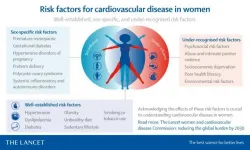(Press-News.org) Whether it's plankton exposed to parasites or people exposed to pathogens, a host's initial immune response plays an integral role in determining whether infection occurs and to what degree it spreads within a population, new University of Colorado Boulder research suggests.
The findings, published May 13 in The American Naturalist, provide valuable insight for understanding and preventing the transmission of disease within and between animal species. From parasitic flatworms transmitted by snails into humans in developing nations, to zoonotic spillover events from mammals and insects to humans--which have caused global pandemics like COVID-19 and West Nile virus--an infected creature's immune response is a vital variable to consider in calculating what happens next.
"One of the biggest patterns that we're seeing in disease ecology and epidemiology is the fact that not all hosts are equal," said Tara Stewart Merrill, lead author of the paper and a postdoctoral fellow in ecology. "In infectious disease research, we want to build host immunity into our understanding of how disease spreads."
Invertebrates are common vectors for disease, which means they can transmit infectious pathogens between humans or from animals to humans. Vector-borne diseases, like malaria, account for almost 20% of all infectious diseases worldwide and are responsible for more than 700,000 deaths each year.
Yet epidemiological studies have rarely considered invertebrate immunity and recovery in creatures that are vectors for human disease. They assume that once exposed to a pathogen, the invertebrate host will become infected.
But what if it was possible for invertebrates to fight off these diseases, and break the link in the chain that passes them on to humans?
While observing a tiny species of zooplankton (Daphnia dentifera) throughout its lifecycle and exposure to a fungal parasite (Metschnikowia bicuspidata), the researchers saw this potential in action. Some of the plankton were good at stopping fungal spores from entering their bodies, and others cleared the infection within a limited window of time after ingesting the spores.
"Our results show that there are several defenses that invertebrates can use to reduce the likelihood of infection, and that we really need to understand those immune defenses to understand infection patterns," said Stewart Merrill.
Unexpected recovery
Stewart Merrill started this work in her first year as a doctoral student at the University of Illinois, studying this little plankton and its collection of defenses. It's a gruesome process if the plankton fails to ward off the parasite: Its fungal spores attack the plankton's gut, fill its body and grow until they are released when the host finally dies.
But she noticed something that had not been recorded before: Some of the doomed plankton recovered. Several years later, she has found that when faced with identical levels of exposure, the success or failure of these infections depends on the strength of the host's internal defenses during this early limited window of opportunity.
Based on their observations of these individual outcomes, the researchers developed a simple probabilistic model for measuring host immunity that can be applied across wildlife systems, with important applications for diseases transmitted to humans by invertebrates.
"When immune responses are good, they act as a filter that reduces transmission," said Stewart Merrill. "But any environmental change that degrades immunity can actually amplify transmission, because it will let all of that exposure go through and ultimately become infectious."
It's a model that can also apply to COVID-19, as research from CU Boulder has shown that not all hosts are the same in transmitting the coronavirus, and exposure does not directly determine infection.
COVID-19 is also believed to be the result of a zoonotic spillover, an infection that moved from animals into people, and similar probabilistic models could be advantageous in predicting the occurrence and spread of future spillover events, said Stewart Merrill.
Understanding prevention of infection
Stewart Merrill hopes that a better understanding of infections in a simple animal like plankton can be applied more broadly to invertebrates that matter for human health.
In Africa, Southeast Asia, as well as South and Central America, 200 million people suffer from infections caused by schistosomes--invertebrates more commonly known as parasitic flatworms. They cause illness and death, and significant economic and public health consequences, so much so that the World Health Organization considers them the second-most socioeconomically devastating parasitic disease after malaria.
They're just one of many neglected tropical diseases transmitted to people by invertebrate hosts such as snails, mosquitoes and biting flies. These diseases infect a large portion of a population but occur in areas with low levels of sanitation that don't have the economic resources to address those diseases, said Stewart Merrill.
Schistosomes live in freshwater environments that people use for their drinking water, laundry and bathing. So even though there are treatments, the next day a person can easily get reinfected just by accessing the water they need. By better understanding how the flatworms themselves succumb to or fight off infection, scientists like Stewart Merrill help us get closer to stopping the chain of transmission into humans.
"We really need to work on understanding prevention of infection, and what that risk is in those aquatic systems, rather than just cures for infection," she said.
The good news is we can learn from the same invertebrates which infect us. In invertebrate hosts that suffer or die from their infections, there is a good incentive to learn how to build an immune response and fight it off. Some snails have even shown the ability to retain an immunological memory: If they get infected once and survive, then they might never get infected again.
"If we can better understand how the environment shapes those defenses, we could predict into the future how environmental changes might amplify or suppress risk of transmission to people," said Stewart Merrill.
INFORMATION:
Additional authors on this paper include Zoi Rapti and Carla Cáceres at the University of Illinois.
Fifty years after presumably becoming extinct as a breeding species in Bulgaria, the Griffon Vulture, one of the largest birds of prey in Europe, is back in the Eastern Balkan Mountains. Since 2009, three local conservation NGOs - Green Balkans - Stara Zagora, the Fund for Wild Flora and Fauna and the Birds of Prey Protection Society, have been working on a long-term restoration programme to bring vultures back to their former breeding range in Bulgaria. The programme is supported by the Vulture Conservation Foundation, the Government of Extremadura, Spain, and EuroNatur. Its results have been described in the open-access, peer-reviewed Biodiversity Data Journal.
Two large-scale projects funded by the EU's LIFE tool, one of them ongoing, facilitate the import of captive-bred or ...
Sophia Antipolis, 17 May 2021: Women with mildly elevated blood pressure in their early 40s have a two-fold risk of acute coronary syndromes in their 50s compared to their counterparts with normal blood pressure. That's the finding of a study published on World Hypertension Day in the European Journal of Preventive Cardiology, a journal of the European Society of Cardiology (ESC).1
"Even if they feel healthy, women should have their blood pressure measured by their primary care physician and repeated at regular intervals with the frequency dependent on the level," said study author ...
Regular gamblers were more than six times more likely to gamble online compared to before the COVID-19 pandemic, according to new research.
The study, led by the University of Bristol and published today (17 May) in the Journal of Gambling Studies, showed regular male gamblers were particularly prone to gambling more often online during the public lockdown in the UK, compared to their previously reported gambling habits.
Although overall men and women gambled less frequently during lockdown, partly due to betting shops being closed, some forms of gambling increased. For instance, usage of online gambling, including poker, bingo, and casino games, grew six-fold among regular gamblers. Respondents who gambled occasionally were still found to be more than twice ...
A unique commission that today issued major new recommendations aimed at fully understanding and reducing the global burden of heart disease in women was led by Roxana Mehran, MD, Professor of Medicine, and Population Health Science and Policy, and Director of Interventional Cardiovascular Research and Clinical Trials at the Icahn School of Medicine at Mount Sinai.
"The Lancet Women and Cardiovascular Disease Commission" developed specific, worldwide recommendations for heart disease prevention and treatment based on an unprecedented global review and analysis. The recommendations ...
The Lancet women and cardiovascular disease Commission outlines 10 ambitious recommendations to improve health outcomes for millions of women around the world and achieve the global targets set.
In the first-ever global report on cardiovascular disease (CVD) in women, researchers call for urgent action to improve care and prevention, fill knowledge gaps, and increase awareness to tackle the worldwide leading cause of death among women. The all female-led Commission report was published in The Lancet and presented during a plenary session at the American College of Cardiology's 70th Annual Scientific Session (ACC.21). ...
ATS 2021, New York, NY - Patients with idiopathic pulmonary fibrosis (IPF), a rare lung disease that causes shortness of breath and low oxygen levels because of lung scarring, have worse outcomes if they live in poor neighborhoods, according to research presented at the ATS 2021 International Conference.
Gillian Goobie, MD, Human Genetics, Graduate School of Public Health, University of Pittsburgh, and colleagues sought to determine how environmental and occupational factors contribute to the development and progression of IPF. People who live in areas with high neighborhood-level disadvantage, as ...
ATS 2021, New York, NY - By removing "race correction" from the interpretation of pulmonary function test (PFT) results, Black individuals were shown to have a significantly higher prevalence and severity of lung disease, according to research presented at the ATS 2021 International Conference.
Alexander Moffett, MD, clinical fellow, Division of Pulmonary, Allergy and Critical Care, University of Pennsylvania Perelman School of Medicine, and colleagues, sought to determine the real-world consequences of race correction for the interpretation of PFT results. Race correction, a standard practice in PFT interpretation that has no biological basis, results ...
NEW YORK, NY (May 16, 2021)--Brief pulses of ultrasound delivered to nerves near the kidney produced a clinically meaningful drop in blood pressure in people whose hypertension did not respond to a triple cocktail of medications, reports a new study led by researchers at Columbia University Vagelos College of Physicians and Surgeons and NewYork-Presbyterian.
In a clinical trial of the procedure, called renal denervation, daytime blood pressure after two months had dropped 8 points compared to a 3-point drop in patients who were treated with a sham procedure. Nighttime blood pressure decreased ...
Research led by scientists at Children's Cancer Institute and published this week in the international journal, Clinical Cancer Research, has found a combination of therapies that appears to be highly effective against high-risk neuroblastoma and other forms of aggressive childhood cancer.
Up to half of all cases of neuroblastoma newly diagnosed in children are 'high-risk', meaning the cancer grows aggressively and is difficult to treat. Despite receiving intensive treatment, most children with high-risk disease die within five years of diagnosis, while those who survive are often left with serious ...
ATS 2021, New York, NY - A weighted "lottery" designed to increase access to the antiviral drug remdesivir during the May-July 2020 COVID-19 surge for those most affected by the coronavirus, including members of the Black, Latinx and indigenous communities, led to more equitable distribution of the badly needed medication, according to research presented at the ATS 2021 International Conference.
At a time when supplies of COVID-19 medications were scarce, Douglas B. White, MD, MAS, vice chair and professor of critical care medicine, UPMC endowed chair for ethics in critical care medicine and director of the Program on Ethics and Decision Making in Critical Illness, University of Pittsburgh School of Medicine, and colleagues, convened ...


